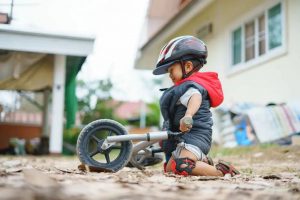Riding, don’t make these ten taboos!
Be well prepared and you can start on the road.

But in the process of riding, the following things should be avoided.

1.

When using the brake improperly, please brake the rear wheel first to avoid falling due to excessive braking force.
The position of the rear brake handle can be changed according to different personal habits.
Before going on the road, ask a professional technician to adjust the tightness of the brake line and check the clearance and wear between the brake block and the wheel.
2.
Improper turning mode when turning, the body will tilt.
At this time, the inner pedal plate should be kept horizontal or placed above to avoid touching the ground.
You should slow down before entering the curve.
It is very dangerous to brake during turning.
3.
Wrong way to go uphill and downhill.
Some people will stand up and step on the pedal when riding uphill.
However, this posture should be avoided unless it is a particularly steep slope or needs to accelerate the sprint.
In addition to more physical exertion, the improved Riding Center of gravity leads to poor handling, and the rear wheels are easy to slip.
The correct way should be: when going uphill, move forward in sitting position, lower the upper body, keep the center of gravity, and tread forward with light tooth ratio; When going downhill, the center of gravity of the body moves back, the body is pressed down, and the thighs clamp the cushion.
Pay attention to the speed control.
The progressive braking method shall be adopted, and emergency braking is strictly prohibited.
4.
If you don’t keep a safe distance, if you ride with the team, you should keep a safe distance between vehicles at any time.
During long-distance riding, the front car will be windproofed to facilitate riding; When the road is wide and straight, it is easy to distract the riders.
It is recommended that the riders should be separated by at least one bicycle to ensure safety.
5.
Roll the pavement protrusions to understand the pavement conditions.
When riding, keep your eyes far away to avoid excessive speed, and observe whether there are obstacles or pits on the pavement.
If you can’t dodge, it is recommended to pull up the handle and cooperate with the pedal force to make the front wheel jump over.
Reduce the impact force.
6.
When riding with headphones, it is difficult to know the external information, such as the horn sound of the rear vehicle or the reminder of teammates.
It is also easy to cause accidents if the headphone cable is too long.
It is forbidden to wear headphones to listen to music when riding.
If you want to listen to music or radio, you can use devices such as loudspeakers.
7.
Mental distress (physical discomfort) reluctantly on the road.
If you are physically or mentally ill and can’t concentrate, you should plan to move forward or delay the journey in an alternative way to avoid danger.
8.
It is forbidden to force the vehicle fault.
If the vehicle fault cannot be repaired immediately, it shall move forward in other alternative ways or request road rescue.
Especially if the brake or wheel set (tire) and other components are in abnormal conditions, do not ride reluctantly.
9.
Stop riding in bad weather.
In case of typhoon, heavy rain, lightning strike, strong wind and other fierce weather factors, change the itinerary or cancel it.
If you encounter severe weather conditions on the ride, you should wait for the wind and rain to ease before moving forward.
Avoid riding at noon (12:00 to 2:00 p.m.), or riding at a high temperature of more than 35 degrees Celsius, and replenish water in time.
10.
Do a good job in itinerary planning and avoid night riding.
It is suggested that the itinerary planning should start as soon as possible, increase the rest time at noon, and reach the end of today’s journey before the sun sets.
The light source of the lamp is insufficient and can only be used as an auxiliary to remind other passers-by.
Especially for group riding, avoid riding at night to avoid accidents due to poor vision, unfamiliar road surface and other factors…

